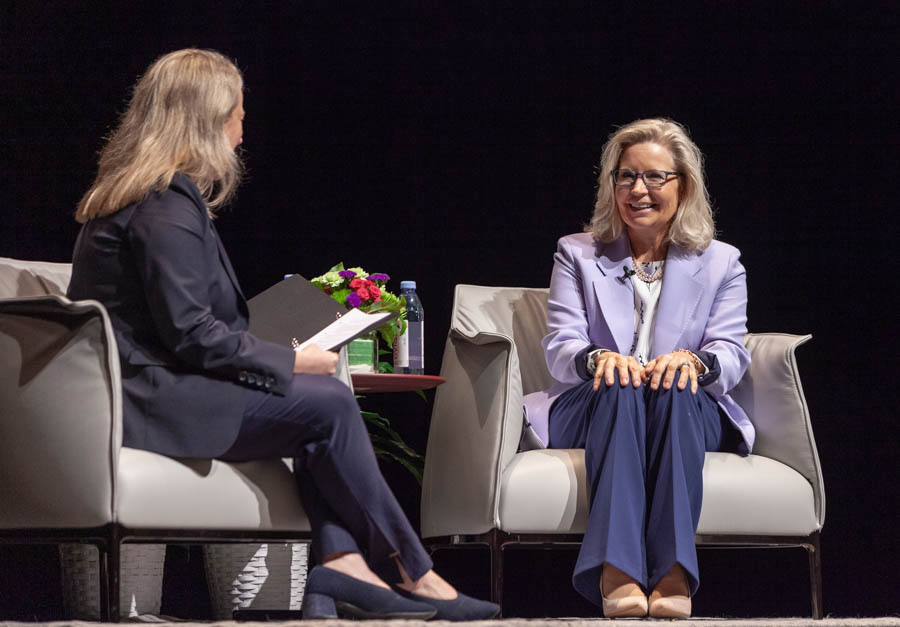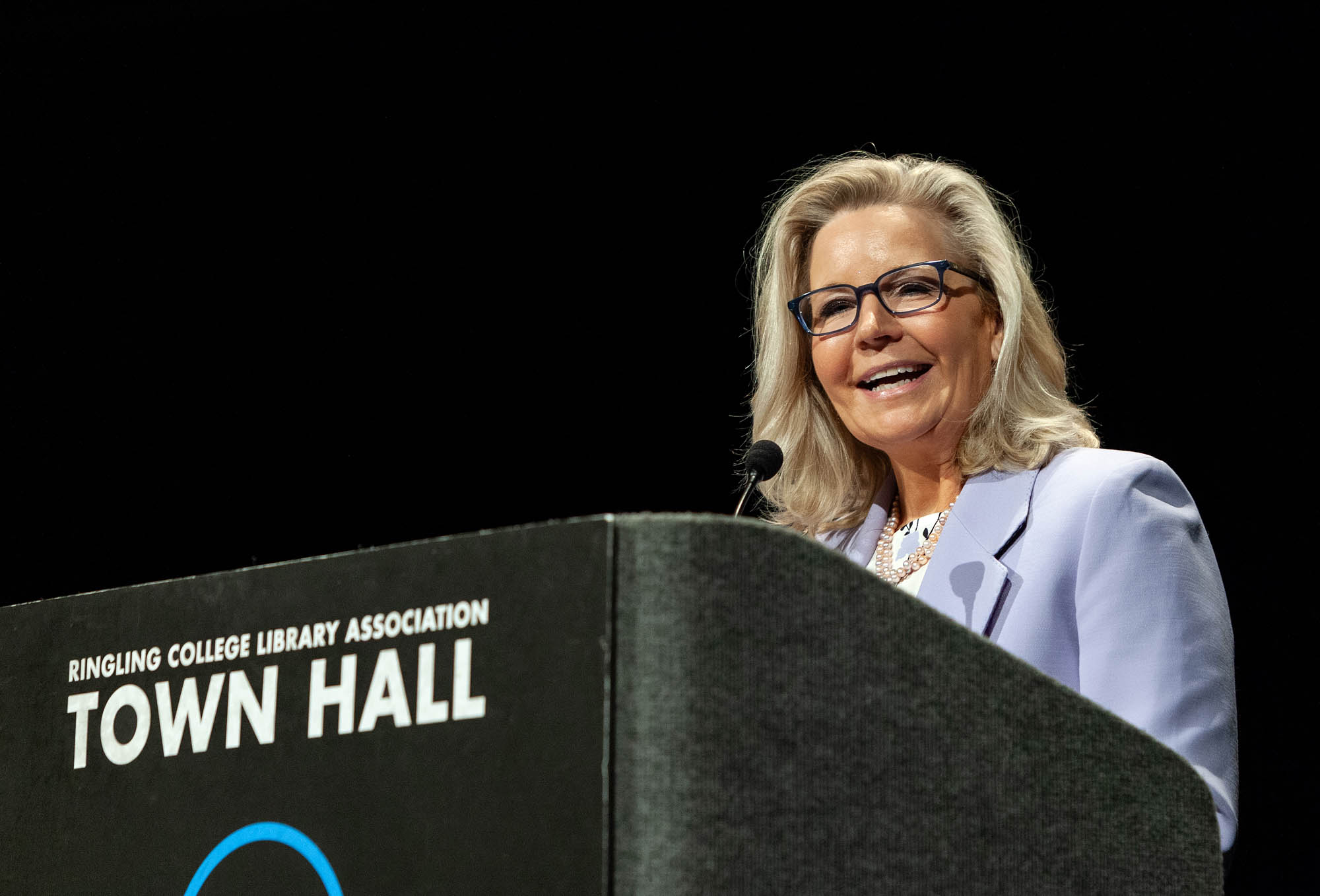As Liz Cheney tours the country, she regularly assails the shift in Republican politics in America. The impact of Donald Trump, the last Republican president and the party’s nominee in 2024, realigned the key principles of the modern GOP in ways that left her out of favor with the party. But as she spoke to an audience in Sarasota, the Wyoming Republican made clear she sees worse consequences from Trump’s actions, particularly in the wake of his 2020 loss to Joe Biden.
Standing onstage at the Van Wezel Performing Arts Hall, Cheney recalled the stunning testimony from people working in the White House on Jan. 6, 2021–the day Congress was expected to certify the election results. Pro-Trump protesters, after hearing complaints about the integrity of the election for weeks, had gathered in Washington, D.C. Trump, ahead of the day's scheduled events, spoke to supporters at a rally at the White House eclipse, not to calm them down but to rile them up. “He knew that the mob was angry and he knew that the mob was armed. And he sent them to march on the Capitol,” Cheney recalled.

As the former Congresswoman promoted her new book, Oath and Honor, she devoted an inordinate amount of her time to recounting that day’s events and the findings of the Jan. 6 committee, where she was one of two Republicans to serve. Since that time, Cheney lost her seat in Congress in a primary challenge to a Republican supported by Trump and then-Speaker of the House Kevin McCarthy. Since publishing the book, Cheney’s name has come up as a potential third-party candidate for president.
It's easy to recall, though, that the name Cheney (until fairly recently) seemed synonymous with, even central to, Republican politics in America. It is certainly no distant memory to Cheney. Even before her own entry into politics, she spent years watching her father, Dick Cheney, rotate through important jobs as a chief of staff, Republican congressman and U.S. vice president. She volunteered for years for her father’s Republican campaigns. She watched the recount in Florida in 2000, which decided the presidential election and made her father vice president. While the outcome was contentious and the fight emotional, it struck her even then when Democrat Al Gore conceded on national television.
“He knew he was disappointed, his supporters were disappointed, but that disappointment had to be overcome by love of country,” she recalled. Over the next few weeks, the Bill Clinton administration transitioned into the George W. Bush administration. As vice president, Gore oversaw the certification of his own defeat, even gaveling down objections at the time to accepting Florida’s slate of electors.
But it’s the words in the concession that Liz Cheney remembered so clearly. Gore had chosen to reach into history for the right quote, seizing on the words of Stephen Douglas (when he lost to Abraham Lincoln at a time of division so deep the presidential election results would arguably prompt the American Civil War). Still, Douglas told supporters, “Partisan feeling must yield to patriotism.” The hurt feelings of the campaign, the sting of defeat–it had all occurred before and would again. But America underwent a peaceful transition of power at the inauguration. That would happen repeatedly for more than a century, Liz Cheney noted. That is, until the end of Trump’s term.
Liz Cheney kicked off the Ringling College Library Association’s Town Hall series this year, which, for decades, has brought world leaders, cultural figures and other prominent figures with worthy books to tout. In recent years, the series took a blow, thanks to the pandemic, which shut down lectures in 2020 (and still failed to sell out seats later, as Sarasota’s audiences remained reluctant to pile into crowded auditoriums). Whether it was that the fear of the virus sufficiently passed or the choice of speaker particularly inspired, Liz Cheney’s speech in January became the first sold-out lecture in the series since the coronavirus first surfaced in a Sarasota hospital.
That’s telling in Sarasota County, where Trump beat Biden in 2020 with nearly 55% of the vote. The greater-than-28,000-vote margin victory in the county helped the Republican win Florida’s electoral votes, making Florida one of just two states in which Trump performed better against Biden than he had against Democrat Hillary Clinton in 2016. But while Sarasota County once held a reputation as one of Florida’s most closely divided counties politically (in 2008, Barack Obama came within 300 votes of beating John McCain here), it has recently earned more attention for a rightward shift in politics. Rumble, a conservative alternative to YouTube, set up its headquarters in recent years on Longboat Key. And Michael Flynn, Trump’s one-time national security advisor, rather infamously relocated to South Sarasota County and has organized a local political contingent around The Hollow.
That didn’t stop Liz Cheney from calling Flynn out by name partway through her speech. “I will remind everybody, go back and look at an interview that Mike Flynn gave on Dec. 18, 2020, in which he said, with all seriousness, that Donald Trump should deploy the military to seize voting machines and to attempt to rerun the election in swing states,” Liz Cheney said. “And Donald Trump has said he thinks Mike Flynn would be a great national security adviser.”
The slam on the local figure drew gasps in the crowd, but Liz Cheney never faced an angry reception. At least among the ticket-buying crowd at a lecture series put on by an arts college, her political message resonated. But it’s also clear that Liz Cheney remains on the outs with the current Republican mainstream.
Liz Cheney’s visit in Sarasota came the morning after Trump emerged as the clear victor of the Iowa caucuses—the first delegate-awarding contest on the 2024 election cycle. Florida Gov. Ron DeSantis came in a distant second place, without taking any of Iowa’s 99 counties. DeSantis suspended his presidential campaign days later, and Trump went on to defeat Nikki Haley (once his choice as U.S. ambassador to the United Nations) in New Hampshire’s first-in-the nation GOP primary. The former president already appeared on track to secure the nomination by late February, when he defeated Haley in her home state of South Carolina.

Speaking to Sarasota media ahead of her speech, Liz Cheney acknowledged that nobody seemed capable of stopping Trump from winning the 2024 Republican nomination. But she did not know that Trump, even running effectively as a GOP incumbent, won only about half the votes in early states; he won over 51% of Republican caucus-goers in Iowa and 54% of primary voters in New Hampshire.
“I think it tells you that he's beatable, and we've got to beat him. But again, it's going to be, I think, a long, long battle,” she said. “It's going to be a battle all the way until November, I would imagine.”
For the record, Liz Cheney of late has tamped down talks of an independent challenge, at least if it appears her entry in the race would hurt Biden and help Trump. She told the Van Wezel audience that defeating Trump remained her chief concern.
But even if Trump again faces a loss, she is concerned about the state of Congress since her own defeat nearly two years ago. Conservative principles and the rule of law, she fears, have taken a back seat to extremism and a hunger to win arguments instead of reach compromises. Before voting to impeach Trump for the events of Jan. 6, Liz Cheney served in Republican leadership in Congress, as GOP conference chair, though she lost that role well before her electoral defeat. But, at one point, she had a close working relationship with McCarthy. That soured long ago.
“After the 2020 election, Kevin McCarthy was in a position to have done the right thing, to have really led the Republicans away from this dangerous place we found ourselves,” Liz Cheney recalled. “And, of course, he chose not to do that. Instead, he brought Donald Trump back into the fold.”
Tossing the Liz Cheneys from the party didn’t seem to hurt McCarthy’s political ambitions, at least initially. He led the caucus in 2022 to a majority in the U.S. House, which meant the California Republican ascended to House speaker. But that would be short-lived, as his own members would lead a historic political coup before the end of 2023 and drive McCarthy from the speakership and ultimately from Congress altogether.
McCarthy seemed to enjoy little good will by the time he resigned in December. U.S. Rep. Vern Buchanan, a Sarasota Republican, had reportedly cursed McCarthy out on the House floor after the speaker stopped Buchanan from securing the House Ways and Means Committee chairmanship. It was one of many apparent betrayals of colleagues that left McCarthy with too few allies to save his skin when a group of Freedom Caucus members made a motion to vacate the speaker’s office and sent him packing.
But Liz Cheney wonders if Congress is any better off now. Her book includes pages she had to fight with her publisher to keep, about a legal effort by a little-known Congressman named Mike Johnson who wanted the House to demand the Supreme Court effectively overturn the 2020 presidential election. Johnson, as it happens, emerged from a chaotic leadership struggle last year as McCarthy’s successor as speaker.
“He's a dangerous player in all of this as well,” Liz Cheney said of Johnson. “And I think the fact that, just within the last 10 days or so, he's been unwilling to say that Joe Biden won the 2020 election shows that.”
It may seem an odd position for a politician who, a few years ago, served as the No. 3 Republican in the House, but she no longer wants either chamber of Congress to have a GOP majority by the time the next presidential votes get counted. “You can't count on a group of House Republicans at this point to uphold the Constitution,” Cheney told reporters in Sarasota, hanging her head in disapproval. “I think it's very important that Mike Johnson not be the speaker in January of 2025.”










